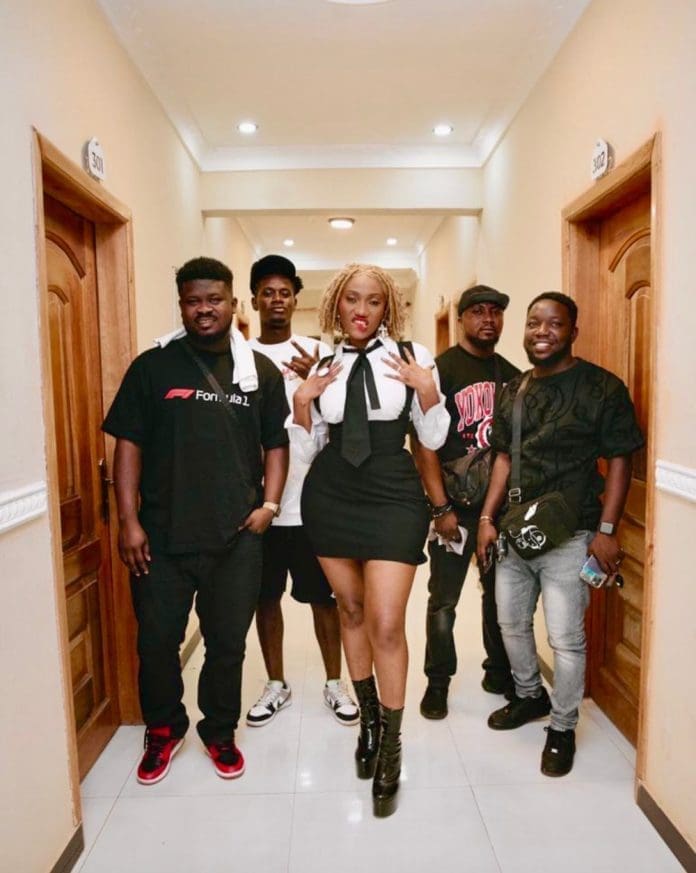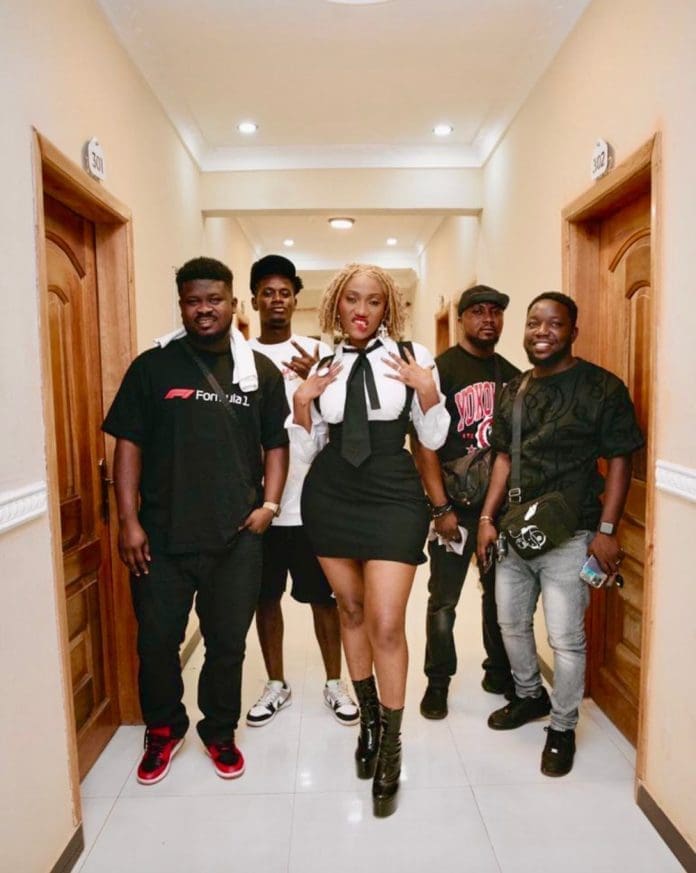
Wendy Shay’s third studio album Ready has surpassed 10 million streams on Audiomack within one week of release, yet the Afropop star insists her success comes at a cost four times higher than what male counterparts pay for similar achievements in Ghana’s male dominated music industry.
The 13 track project dropped October 24 to immediate commercial success, reaching number one on Afro Sounds on Audiomack and trending across Apple Music. Despite the impressive numbers, Wendy revealed during a GHOne TV interview that female artists navigate biological, emotional, and systemic barriers that fundamentally alter the path to sustained relevance.
She described how menstrual cycles, hormonal fluctuations, and physical fatigue create performance challenges men never face, yet industry expectations demand women maintain identical output without accommodation. The singer emphasized that pushing through exhaustion while managing biological realities requires resilience male artists simply don’t need to develop.
Beyond physical challenges, Wendy pointed to deeply ingrained cultural perceptions that position women as unsuitable for leadership roles. She noted that in Ghana and across similar societies, women historically occupied domestic spaces while men controlled public and professional domains, creating lasting assumptions about female competence that persist despite changing narratives.
This societal positioning forces female artists into constant proof cycles where each accomplishment must validate their right to occupy space rather than simply demonstrating talent. Wendy stressed that male artists receive automatic credibility while women face perpetual scrutiny questioning whether they truly deserve their positions or merely benefited from circumstance.
The Ready album represents Wendy’s seventh year in music, a journey she characterized as emotionally and spiritually transformative. She described the project as reflecting inner work that clarified her soul mission and directional focus, positioning herself as prepared to showcase talent globally after years building mental and emotional readiness.
Production took nearly a year involving substantial financial investment, sleepless nights, and intensive creative brainstorming sessions. Wendy acknowledged the good kind of stress inherent in album creation while emphasizing that capital requirements make independent music careers extremely challenging without multiple revenue streams.
She sustains operations through weekend performances, streaming revenue, and ambassadorial partnerships with brands including HiSense and PEA Beverages. Despite these income sources, Wendy stressed that capital intensive production demands make investor support necessary for artists attempting to maintain competitive output quality.
The album features collaborations with Mavado, Olivetheboy, Itz Tiffany, and Nigyboy, blending Afropop, rhythm and blues, and Afrobeat influences into what producers describe as globally appealing yet distinctly African sound. Tracks like Black Coffee, Don’t Be Silly, and Apology explore themes of love, resilience, and self confidence through infectious melodies paired with empowering lyrics.
Wendy launched a five thousand dollar challenge inviting fans to create viral content around Black Coffee, offering three thousand, fifteen hundred, and five hundred dollar prizes for top videos demonstrating creativity and engagement. The initiative aims to amplify organic promotion while rewarding fans who actively participate in spreading music beyond passive listening.
Her annual Shay Concert is scheduled for November 22 at West Hills Mall, postponed from October to honor final funeral rites for the late Daddy Lumba who passed July 26. Wendy described the free event as her way of giving back to society, promising appearances from favorite artists in celebration of Ready’s release and her continued growth.
The timing proved bittersweet as Wendy hoped Ready would contribute to the healing process as Ghana bid farewell to one of its most iconic musical figures. Daddy Lumba’s influence on highlife and Ghanaian music broadly created the foundation upon which contemporary artists like Wendy build their careers.
Industry challenges for female artists extend beyond physical and cultural barriers into predatory behavior that remains normalized despite increasing awareness. Wendy previously revealed that unwanted advances from men persist regardless of established brand status or professional achievements, describing such experiences as very normal for women in entertainment.
She told Headless YouTuber in October that attraction between men and women extends into professional spaces, creating situations where female artists must constantly navigate inappropriate offers while maintaining career momentum. Wendy advised women to understand their values and principles, using beauty strategically without compromising morals regardless of circumstances.
More troubling revelations emerged during International Women’s Day interviews when Wendy disclosed that some male artists demand sexual exchanges before agreeing to feature on songs with established female collaborators. She contrasted this with how the same men freely work with upcoming male acts, exposing double standards where women’s professional requests carry inappropriate personal expectations.
The male dominated industry structure means women face rejection rooted in gender rather than talent or commercial viability. Wendy emphasized that established female artists seeking legitimate collaborations encounter sexual propositions while less experienced men receive straightforward professional consideration, illustrating systemic barriers operating beyond individual prejudice.
Wendy entered the music scene in 2018 shortly after Ebony Reigns’s death, facing immediate comparisons despite working different genres with distinct vocal textures. She described the period as the most intense bullying any Ghanaian artist has experienced, revealing that trolling became so overwhelming her mother urged her to quit music and return to Germany.
The pressure stemmed partly from timing as RuffTown Records fans weren’t prepared to accept a new female artist from the same label that lost their beloved Ebony. Wendy characterized the experience as painful and lonely, admitting she wouldn’t wish it on anyone despite ultimately surviving through faith and team support.
She won 14 awards within six months of debut, dropping several hit songs that proved resilience pays dividends when talent meets determination. The success validated her decision to persevere through criticism that questioned everything from her authenticity to her right to occupy space previously held by Ebony.
Wendy’s nursing background provides perspective that differentiates her from artists who never worked outside entertainment. She attended music classes in Germany where she schooled before returning to Accra, bringing international exposure that influences her genre blending approach mixing Afrobeats with highlife and hiplife elements.
Her Shay Foundation focuses on education and healthcare initiatives supporting vulnerable communities, demonstrating commitment to giving back beyond entertainment contributions. Wendy remains vocal about issues affecting women and youth, positioning herself as a role model whose platform extends beyond music into social advocacy.
The deep Christian faith evident in her lyrics coexists with performances carrying clear sexual connotations, reflecting complexity many critics struggle to reconcile. Wendy’s innocence despite provocative content stems from genuine belief she serves others through music, viewing her mission as spiritual rather than purely commercial.
She described women as built differently from men, explaining that female artists take things personally in ways that prevent the kind of public beefs male counterparts use to boost popularity. While acknowledging how rivalries between Sarkodie and M.anifest or Shatta Wale and Stonebwoy benefited their careers, Wendy argued women hold emotions longer, making professional disputes risk becoming destructively personal.
This emotional difference connects to her broader argument about biological and psychological variations requiring different strategies. Wendy insisted that mental strength and determination remain essential for women pursuing leadership, advising female artists to build themselves up and recognize they’re truly prepared for the challenges ahead.
Her comments arrive as Ghana’s music industry grapples with representation questions beyond simple presence counts. Having female artists performing doesn’t automatically mean the industry treats them equitably or creates environments where women can thrive without absorbing disproportionate stress compared to male peers.
Wendy represents Ghana’s most streamed female artist on Boomplay, demonstrating commercial viability that should translate into industry respect and equitable treatment. Yet her consistent testimony about working four times harder suggests commercial success alone doesn’t eliminate systemic barriers or cultural assumptions limiting women’s full participation.
The Ready album’s immediate success proves audience appetite for female driven content when properly promoted and distributed. Wendy’s challenge invitation further demonstrates how contemporary artists must think beyond traditional promotion into social media engagement strategies that leverage fan creativity for organic reach expansion.
As Ghana’s entertainment sector continues growing into a significant economic contributor, questions about equitable treatment for women will increasingly demand institutional responses beyond individual resilience. Wendy’s testimony provides documentation of barriers that policy interventions and industry standards could address if stakeholders prioritize meaningful change over performative inclusion.
Her seventh year milestone arrives at a moment when conversations about women’s roles in leadership, entertainment, and public life gain momentum across African contexts. Whether the music industry adapts to address systemic challenges Wendy describes or continues expecting women to work exponentially harder for identical recognition will signal how seriously Ghana takes its commitment to gender equity beyond rhetoric.
